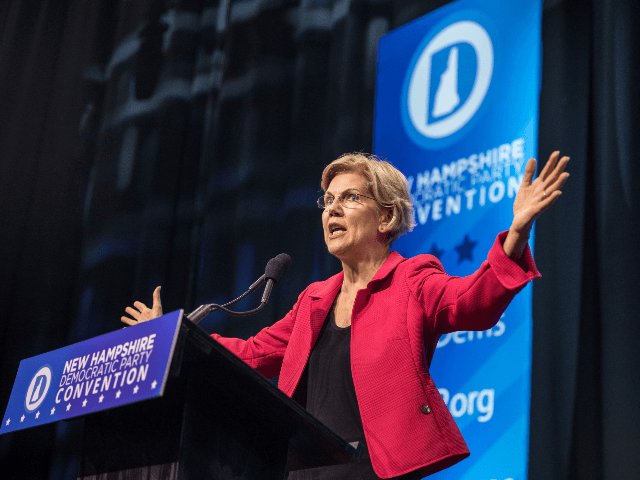Presidential hopeful Sen. Elizabeth Warren (D-MA) is getting some media attention after her single-digit, fourth-place finish in the New Hampshire primary, but it is not the kind candidates seek.
USA Today published an in-depth article about what has gone wrong in the Warren campaign — after only one caucus and a primary — and how it will not be easy to gain the momentum she needs to win the Democrat nomination.
A reporter talked to people who were at Warren’s final get out the vote rally in New Hampshire, including Richard Lemmerman, a 60-year-old investor from Hampton, New Hampshire.
“She’d make a good secretary of State, a great attorney general. I just don’t think she’s going to be a good president,” Lemmerman said.
“In the end, as people start to focus on who’s the best progressive that’s got a chance of going the whole way, Bernie was winning that battle,” Joe Trippi, who ran Vermont Gov. Howard Dean’s failed presidential bid in 2004, said in the USA Today piece. “When it came to who was moving at the end among women who really wanted to see a woman get the nomination … it starts to go to Amy.”
“She was just drifting down, as was Biden, and the others were basically gaining ground at her expense,” Trippi said.
USA Today interviewed Rachel Bitecofer, a political scientist and assistant director of the Wason Center for Public Policy at Christopher Newport University, who said the far-left progressive faction in 2020 has proven smaller than in 2016:
In New Hampshire, the two so-called “progressive lane” candidates, Sanders and Warren, accounted for only 35% of the overall vote. Bitecofer said more moderates and independents are taking part in the Democratic primary than in past years, including in New Hampshire, where voters registered as “undeclared” could take part.
“Her problem is there’s really two people in that progressive faction, but the amount of votes to divide between them is smaller and so she’s really struggling,” Bitecofer said.
Neil Levesque, director of the New Hampshire Institute of Politics at Saint Anselm College, told USA Today that New Hampshire voters put Warren ‘on a shelf’ when she struggled with her explanation about her Medicare for All plan.
“While they remained uncommitted, Sanders’ steady rise and Klobuchar’s debate performance last week eroded her support,” USA Today reported Levesque said of the Warren campaign.
“She worked very hard, she’s an excellent candidate, great staff,” he said. “Everything was there. But sometimes it just doesn’t add up.”
Warren and her campaign, of course, are sending out a different message after New Hampshire and ahead of Nevada and South Carolina primaries.
USA Today reported on Warren having a plan going forward:
Following the latest setback, Warren vowed to “fight back” as her campaign takes the long-view, noting 98% of Democrats still haven’t voted and insisting she’s the “consensus choice of the widest coalition of Democrats.” But with early voting already underway in some Super Tuesday states, and the Nevada caucuses looming in a week, a reboot is needed quickly.
The day after the New Hampshire defeat, the Warren campaign issued an email to supporters that didn’t sugarcoat the outcome: “Let’s face it: Last night didn’t go the way we wanted it to go,” it began, later encouraging supporters to “take a moment and feel that pain” but to press on. Take a walk around the block, eat an extra piece of chocolate, hug your pet, adopt a pet, watch videos of cats and dogs who are friends, call a friend — whatever works,” the email read. “But once you’ve let it all out, take a deep breath, square your shoulders, and make a plan — a plan to fight back and win. A plan to help make sure that we won’t have to feel this way again.”
“It is a very fluid field, and even knocking on doors in Iowa and New Hampshire right up until Election Day, people were still making up their minds,” Michelle Wu, a Boston city councilor at-large and Warren supporter who campaigned for her in both states, said in the USA Today report. “Voters are really wanting to think about November. That means that it will be a long race and a long primary, and Elizabeth’s operation is built for the long haul”:
And then there’s the financial reality of a presidential campaign. Data from Advertising Analytics show that Warren cut television ad spending in South Carolina but is maintaining advertising levels ahead of the February 22 Nevada caucuses.
“I need to level with you,” Warren said in a campaign video released Wednesday asking supporters to donate to the campaign. “Our movement needs critical funds so I can remain competitive in this race through Super Tuesday.”
CNN’s Anderson Cooper asked Warren directly if she knew why she did so poorly in New Hampshire.
“I don’t,” Warren said. “But I can tell you this: I can tell you that it’s what I fight for. And I’m going to get out there and keep fighting for it and keep talking about it. I think we are in a very frothy place right now, but do keep in mind, we’ve only heard from two states.”
“We have 98 percent of our states and territories left to go,” Warren said.
Follow Penny Starr on Twitter

COMMENTS
Please let us know if you're having issues with commenting.